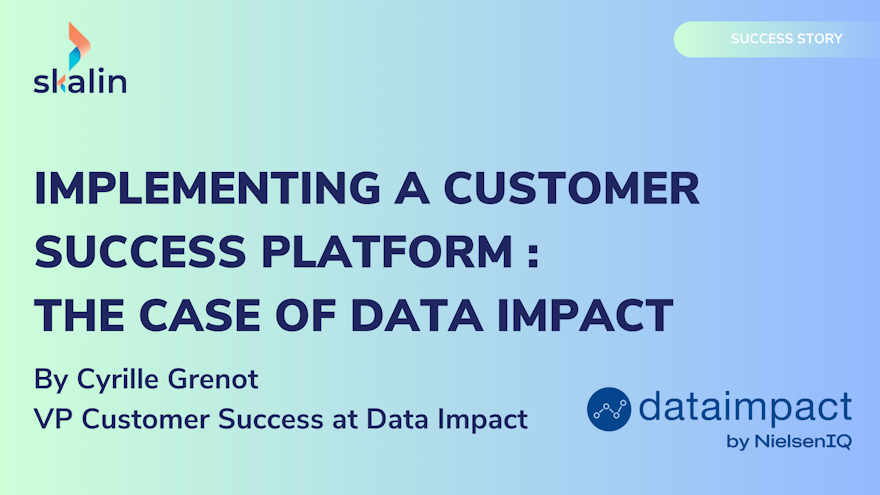Are your Customer Success Managers struggling with the limitations of your CRM, finding it lacks consolidated data? It might be time to consider subscribing to a Customer Success Platform! However beneficial a dedicated CS tool can be, it's crucial to properly manage its implementation and adoption.
Cyrille Grenot, VP of Customer Success at Data Impact, elaborates on why and how he implemented the Skalin Customer Success Platform.
Could you please provide a summary of your career journey and introduce Data Impact?
My professional background spans across the consumer goods and retail sectors, initially in consulting, followed by roles in distribution and within a food group. Five and a half years ago, I embarked on my journey with Data Impact as a Customer Success Manager (CSM), becoming the first employee to hold this title. After a year, I progressed to the role of Customer Success Director (CSD), and with the company's expansion, I assumed the position of VP Customer Success.
Data Impact operates as a B2B SaaS platform specialising in serving agri-food groups. Our platform offers comprehensive omnichannel data insights for e-commerce, encompassing product ranges, promotions, and pricing strategies. Currently, we serve 350 clients, with approximately a hundred based in France.
Our team at Data Impact comprises 250 employees, with about 40 dedicated to the Customer Success department. CSMs play a pivotal role, bridging customer relations and consulting, while also incorporating a commercial aspect as they oversee renewals and upselling initiatives.
You've been using Skalin for 2 years now. Could you provide some insight into your background when you first started using it ?
At the time, we had a team of approximately 15 Customer Success Managers (CSMs) and relied on Salesforce CRM and Google Analytics to gain a broad overview of platform usage. However, we found that Salesforce served more as a data repository rather than an actionable tool. While we meticulously recorded customer interactions, we struggled to obtain a cohesive view and lacked actionable insights. Consequently, adoption rates varied, and team commitment was low. Additionally, generating reports and monitoring CSDs was a time-consuming and cumbersome process.
The decision to adopt Skalin was driven by our need to establish a Health Score. With over 150 customers already onboarded, prioritizing our efforts became essential. Implementing a Health Score required leveraging third-party solutions.
Furthermore, we lacked visibility into platform utilization and an automated alert system to assist our CSMs. Despite each CSM managing a relatively small portfolio of 12 to 15 clients, our close relationship with them necessitated actionable insights. Lastly, the manual processes on Salesforce were labor-intensive. To enhance efficiency and accommodate more clients per CSM, we recognized the importance of streamlining certain operations.
Why not using a Salesforce module?
When we were renegotiating our contract with Salesforce, we were introduced to their Einstein module. Despite being presented with a Health Score of 8/10, it became apparent that our adoption rates were surprisingly low. This revelation prompted us to question the efficacy of the solution, particularly considering its steep price point for a tool we were unfamiliar with. Consequently, we began exploring alternative solutions available in the market.
You evaluated multiple solutions. What prompted you to select Skalin?
For several reasons! We were seeking:
- A highly intuitive, user-friendly tool that would naturally attract users and promote adoption.
- A streamlined setup process with minimal input required from our end, as we strive to maintain pragmatism despite our growing team size.
- Good value for the investment.
What specific functionalities do you perform in Skalin that are not achievable in Salesforce?
- We required a management tool capable of transitioning into 'action plan' mode for our Customer Success Managers (CSMs). Skalin provides actionable features through Playbooks, which include triggers. For instance, we can set up automated emails or receive alerts if a customer's usage declines.
- Additionally, we needed a comprehensive overview of our customers' various markets, as our contracts span across 15 to 20 countries, not limited to France. This capability was lacking in Salesforce but is made possible with Skalin.
- However, our sales operations continue to be managed through Salesforce, where we benefit from a consolidated and quantified perspective on opportunities.
- Furthermore, Skalin's support has been invaluable to us. The team is responsive and demonstrates a deep understanding of customer success, our industry, and the challenges we face. It's more than just a platform.
What advice would you offer for deploying a Customer Success Platform ?
We conducted a 30-day trial to validate our choice. Despite having an existing integration with Salesforce, we opted for a full API deployment. Key best practices that facilitated our Skalin deployment included:
Involving the Product team: Prior to the test launch, we engaged the head of our Product team to ensure swift responsiveness. This alignment was straightforward as they were keen on obtaining usage insights via KPIs.
Engaging with our CEO: We maintained transparent communication regarding our requirements and demonstrated the return on investment model.
Selecting internal champions: We formed a core team comprising 2 CSMs. Collaborating closely with them from the outset was crucial, given their role as end users of the platform.
How did you successfully secure budget approval from your CEO ?
We presented a comprehensive business model to our CEO. Through constructive dialogue and addressing his concerns, we aligned our objectives and demonstrated that Skalin was the optimal solution. Ultimately, our CEO entrusted us with the final decision-making authority.
Furthermore, our CEO was cognisant of the challenges we faced in accessing information through Salesforce. This common understanding made it easier to garner his support, as he experienced similar difficulties firsthand.
How did you successfully facilitate Skalin's adoption by teams across multiple countries?
We've gradually incorporated Skalin's inputs, such as the Health Score, into our weekly reviews. While we don't review everything, it helps us prioritize. For instance, if we spot a low score, we investigate whether the issue lies in usage or interaction.
Moreover, we've set Health Score targets for each country to achieve collectively. We monitor this KPI at our fortnightly meetings with all the Customer Success Managers (CSMs).
For new team members, we've developed content on Notion and PowerPoint. We've also created a dedicated Slack channel. Finally, the CSM referents are crucial in providing support when needed.
After 2 years, do you feel there are aspects where you would have chosen to proceed differently?
The team has doubled in size, and as we challenge our vision, the needs have evolved accordingly. In hindsight, I believe I would have started industrialising from the outset with Playbooks to be prepared for the team's growth. This proactive approach not only ensures readiness as the team expands but also fosters engagement among team members.

